AN ACT OF WAR
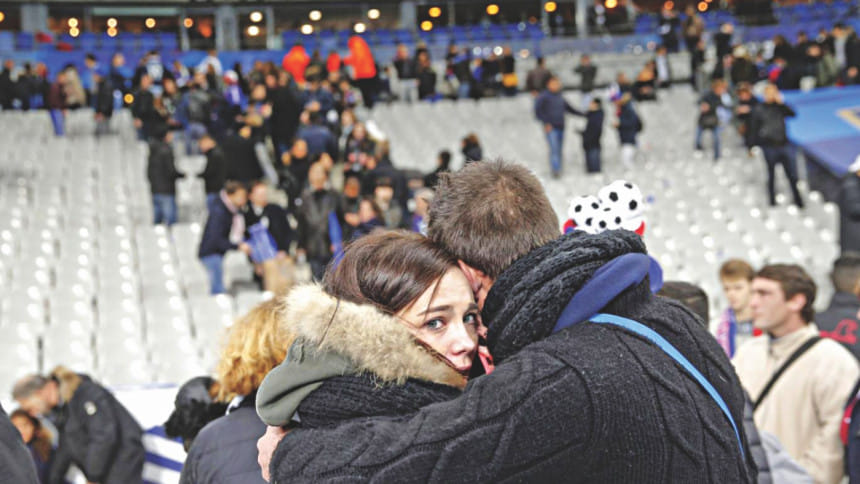
In a wave of bombings and shootings across Paris, gunmen and suicide bombers killed at least 129 people at a concert hall, restaurants and the national sports stadium yesterday, the deadliest day of attacks in France since World War II.
Eight militants, all wearing suicide vests, brought unprecedented violence to the streets of the French capital.
Armed with AK47s and shouting "Allahu Akbar", four of the group marched into a rock concert at the Bataclan venue in eastern Paris and murdered at least 87 people.
Some 42 more people were killed in five other attacks, including a double suicide bombing outside the Stade de France national stadium, where French President Francois Hollande and the German foreign minister were watching a friendly football international.
All eight attackers died during the assaults that also left at least 350 wounded, 100 of them seriously.
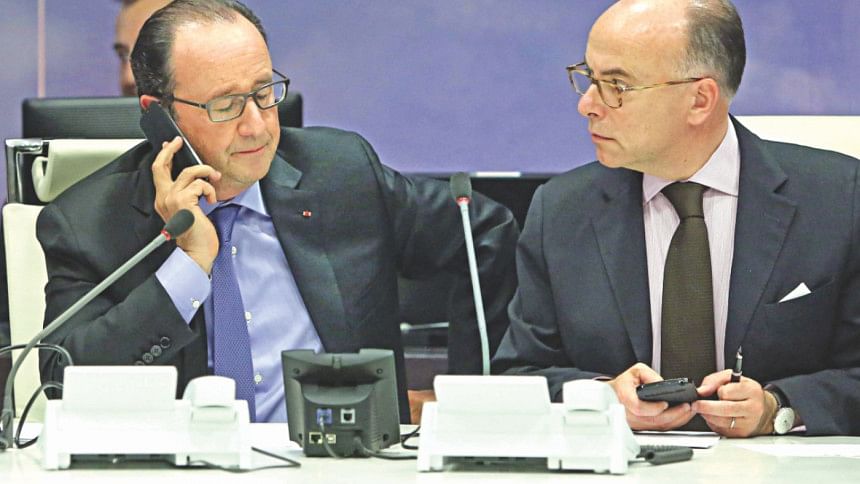
Denouncing the attacks in a strongly worded statement, the French president said the multiple attacks across Paris were "an act of war... committed by a terrorist army, Daesh [another term for Islamic State], against France".
The attacks were "organised and planned from outside" but with help from inside, said Hollande.
"We will be merciless toward the barbarians of Islamic State group. Faced with war, the country must take appropriate action," he said after the attacks, the bloodiest in Europe since the Madrid train bombings in 2004.
These were attacks "against France, against the values that we defend everywhere in the world, against what we are: a free country that means something to the whole planet," Hollande said, calling for unity and courage and saying he would address an extraordinary meeting of parliament tomorrow.
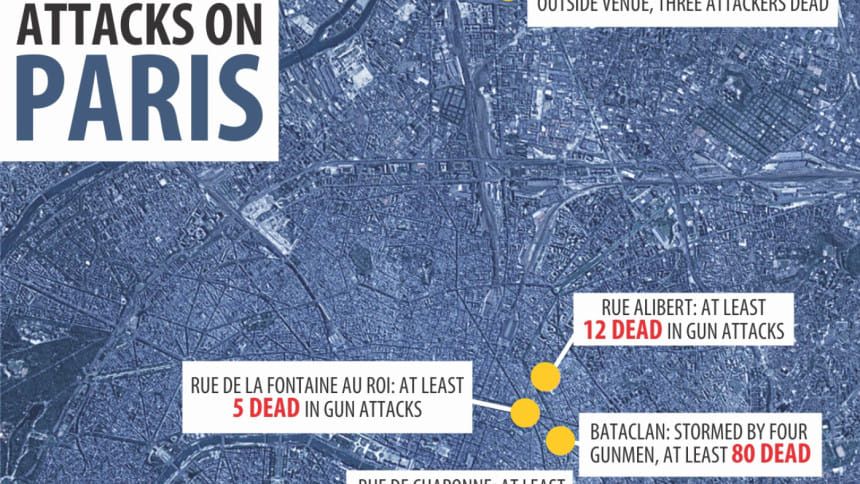
Hollande himself had to be hastily evacuated from the Stade de France stadium when suicide bombers struck outside during the friendly football international between France and Germany.
The French president declared a state of emergency and three days of national mourning.
"All measures to protect our compatriots and our territory are being taken within the framework of the state of emergency," he added.
Claiming responsibility for the deadly attacks, Islamic State said, "Eight brothers wearing explosive belts and carrying assault rifles" conducted a "blessed attack on... Crusader France."
"France and those who follow her voice must know that they remain the main target of Islamic State and that they will continue to smell the odour of death for having led the crusade, for having dared to insult our prophet, for having boasted of fighting Islam in France and striking Muslims in the caliphate with their planes," it said in a statement online.
France, a founder member of the US-led coalition waging air strikes against IS in Syria and Iraq, was on high alert since January when jihadist gunmen killed 17 people in Paris in attacks targeting satirical magazine Charlie Hebdo and a Jewish supermarket.
Briefing reporters in Paris last night, Paris Prosecutor Francois Molins said three teams of attackers were involved in the assault on Paris.
"We can say at this stage of the investigation that there were probably three co-ordinated teams of terrorists behind this barbaric act."
He confirmed that one of the dead attackers was identified as a 30-year-old Frenchman with a criminal record. The man was identified by security services as having been radicalised.
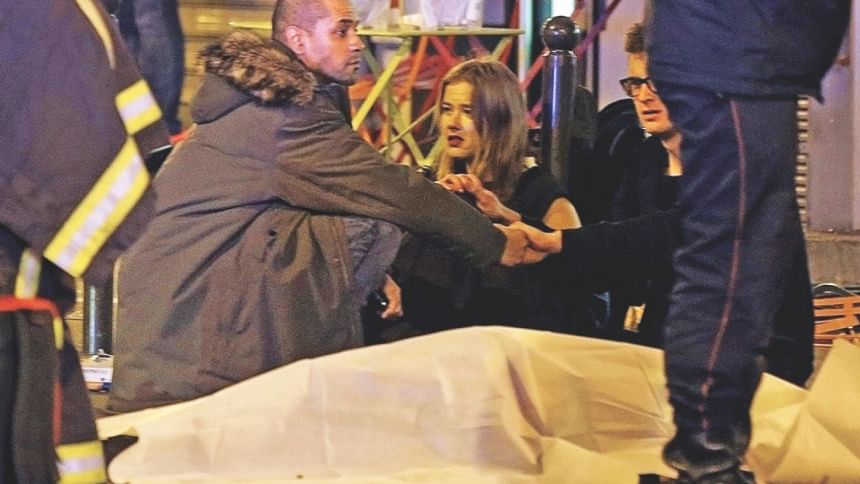
Police were focusing on two vehicles. One was a black Seat used by gunmen in two of the attacks and still untraced.
The other is a black Volkswagen Polo with Belgian registration plates found at the concert venue, said Molins.
The car had been rented to a Frenchman living in Belgium who was identified in a spot check by police on Friday morning as he drove across the Belgian border with two others.
The BBC reports that investigators are working on the theory that there could be another team of attackers who managed to flee the scene.
A Syrian passport was found near the body of one of the eight attackers, the first suicide bombers to strike in France, according to Reuters.
"The holder of the passport passed through the island of Leros on October 3, 2015, where he was identified according to EU rules," Nikos Toscas, Greece's deputy minister in charge of policing, said in a statement.
A Greek police source told Reuters that the passport's owner was a young man who had arrived in Leros with a group of 69 refugees and had his fingerprints taken by authorities there. Police declined to give his name.
According to French media reports, three of the attackers were believed to have come from the Brussels neighbourhood in Belgium where police were carrying out raids.
Belgian police arrested three persons for their alleged links to the terrorist attacks, reports the BBC.
One of the detainees had been in Paris on Friday evening, said Belgian Prime Minister Charles Michel.
Meanwhile, an extra 1,500 soldiers were mobilised to reinforce police in Paris, Hollande's office said.
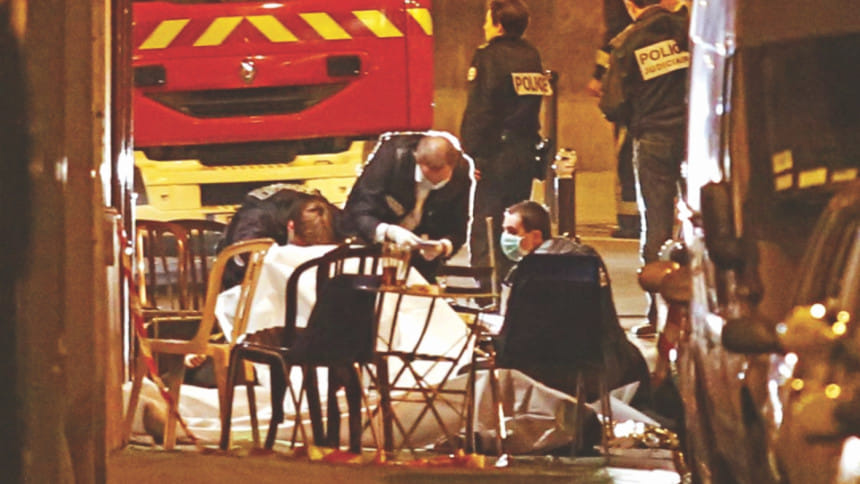
A NIGHT OF HORROR
The worst of the killing occurred at the Bataclan music venue in the trendy 11th arrondissement where more than 1,000 rock fans were at the sell-out show.
A Paris city hall official said four gunmen systematically massacred at least 87 young people at the Bataclan concert hall before anti-terrorist commandos launched an assault on the building.
"They didn't stop firing. There was blood everywhere, corpses everywhere. Everyone was trying to flee," said Pierre Janaszak, a radio presenter who was at the concert by US rock band Eagles of Death Metal.
Hinting at their motives, the gunmen were overheard raging at French President Francois Hollande and his military interventions in the Syrian civil war against the Islamic State group.
As screams rang out and survivors ran over the injured or dead to make their ways to the exits or places to hide, the militants took hostages and began executing them.
"We heard people screaming -- the hostages particularly -- and the threats from the kidnappers," said another survivor, 34-year-old Charles.
Along with around 20 others, he fled to a toilet where he pushed through the ceiling and hid in the cavity.
A police officer who took part in the storming of the building told AFP: "It was horrible inside, a bloodbath, people shot in the head, people who were shot as they were lying on the ground."
Several restaurants near the concert hall were also targeted, including a popular Cambodian eatery in the trendy Canal St Martin area, where bars and restaurants were thronged with young revellers.
Three of the militants blew up their explosive belts at the Bataclan venue as heavily armed anti-terror police raided the venues around 12:30am (2330 GMT), while a fourth was shot dead.
Another attacker blew himself up in nearby Boulevard Voltaire, as the streets were filled with the sound of police sirens and convoys of ambulances shipping hundreds of injured to hospital.
The other three militants blew themselves up at eating places near the Stade de France national stadium.
CONDEMNATION
US President Barack Obama led a chorus of global condemnation of the deadly attacks, as nations pledged solidarity with France.
Countries such as the US, the UK, Spain and India, which have experienced their own mass-casualty attacks, were among the first to voice condemnation.
Saudi Arabia led Gulf Arab states also denounced the brutal attacks.
"I wanted to express our condolences to the government and people of France for the heinous terrorist attacks that took place yesterday, which are in violation and contravention of all ethics, morals and religions," Saudi Foreign Minister Adel al-Jubeir said.
He made the remarks in Vienna where he is attending international talks aimed at finding a solution to end the war in Syria, where IS holds swathes of territory.
The president of the United Arab Emirates, Sheikh Khalifa bin Zayed al-Nahyan, also condemned the attacks as "heinous crimes" and said the UAE would "spare no effort... to fight terrorism in all its forms," state news agency WAM reported.
The top Sunni Muslim religious authority in the oil-rich kingdom, the council of senior ulemas, said the attacks were "contrary to Islam and its principles".
The Qatari foreign ministry condemned the "armed attacks and bombings" in a statement cited by official agency QNA, saying they "contradict all moral and humanitarian principles and values".
There were also condemnations from Bahrain and Kuwait, and from Abdellatif Zayani, head of the six-nation Gulf Cooperation Council which includes Oman.

 For all latest news, follow The Daily Star's Google News channel.
For all latest news, follow The Daily Star's Google News channel. 



Comments